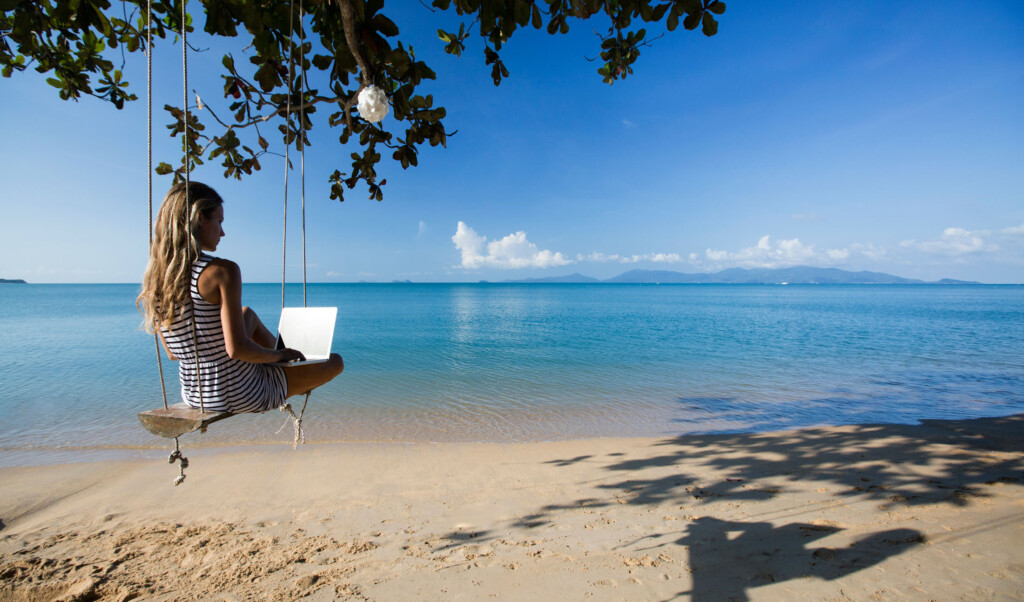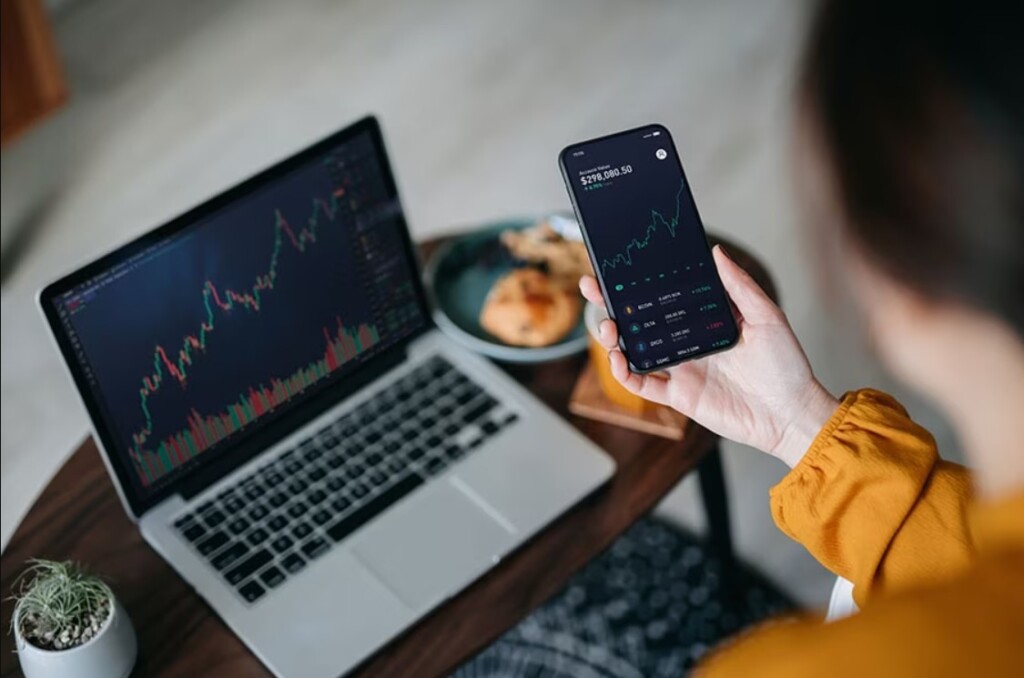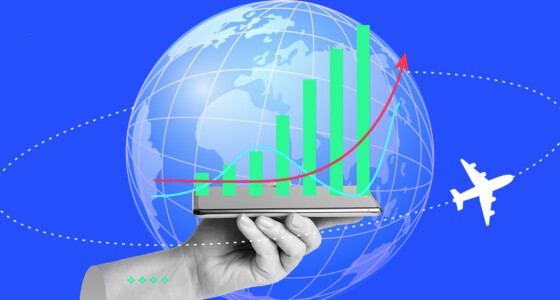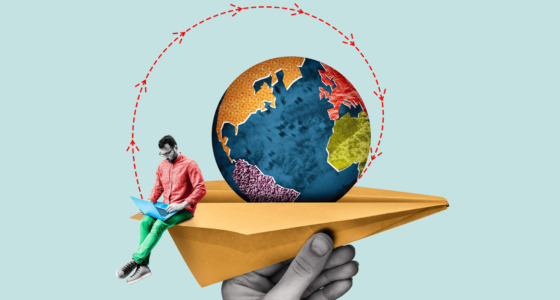

The allure of a location-independent lifestyle has transcended mere aspiration. It’s a tangible reality reshaping work and leisure. At the forefront of this movement was Babis Bizas, a Greek backpacker who claims to be ‘the most traveled person in the world,’ having visited all 195 countries twice since his journey began as a student in 1976.
In 2023, the world offers even more opportunities, especially for traders. If you’re excited about making the most of this time filled with possibilities for the daring, this article is for you.
The digital nomad phenomenon

The concept of digital nomadism emerged in 1997. At that time, Tsugio Makimoto and David Manners coined the term to capture the impact of technology on professional lifestyles. They described digital nomads as individuals whose life is not confined to a specific location. They embody a lifestyle that’s characterized by mobility, exploration, and, often, a location-independent business.
Digital nomads are a diverse group spanning generations, professions, and classes. While mostly young and male, one-third are female, and over half are over 38 years old. They come from various fields, with creativity, IT, and marketing as prominent participants.
Armed with laptops, social media, and phones, digital nomads work remotely from different locations — a beach in Costa Rica one moment, a shared space in Bangkok the next. By merging work and leisure, they have created a new way of life that emphasizes adaptability and independence.
Trading in the digital age
This dynamic community of digital nomads welcomes graphic designers, developers, writers, and consultants, each contributing their unique skills. And trading has evolved to thrive alongside various professions.
Let’s dive deeper by looking at key aspects of trading in the digital age:
- Online platforms — Online trading platforms have become the cornerstone of digital trading. These platforms provide real-time market data, charts, research tools, and execution capabilities, which allow traders to make decisions and execute trades quickly.
- Access to global markets — Traders can now invest in various markets and assets from different parts of the world. This access has opened up opportunities for diversification and risk management.
- Democratization of trading — Online trading has made it possible for retail traders and investors to participate in markets that were once dominated by institutional players. It has reduced the barriers to entry and empowered individuals to take control of their portfolios.
- Data and analytics — The digital era provides traders with an abundance of data and analytical tools. Technical analysis, fundamental analysis, and sentiment analysis are now facilitated by powerful software and data feeds.
- Mobile trading — The proliferation of smartphones has introduced mobile trading apps so that traders can stay connected to the markets and manage their positions on the go.
The lifestyle of a nomadic trader
Let’s take a moment to imagine what a week in the life of a nomadic trader might look like:
Monday
A nomadic trader sets up their trading station in a garden in Pattaya, Thailand. After morning trades, they join a Thai cooking workshop, and in the evening, they explore vibrant night markets.
Tuesday
As the sun rises over the nearby beach, the trader begins their trading day and executes trades according to their researched strategies. During breaks, they take short walks along the shore.
Wednesday
To continuously improve their trading skills, the nomadic trader might dedicate Wednesdays to learning. For example, go to a beach club with an e-book and listen to a podcast on a bike ride. The day is not over, so they begin packing their bags, ensuring a seamless transition to the next location.
Thursday
On Thursdays, they conduct an in-depth review of their trading portfolio. They assess the performance of their trades, identify any patterns of success or failure, and adjust their strategies accordingly. As for where and when they can do it, why not on a plane to Phuket?
Friday
Before unpacking and settling in the new place, the trader follows their routine by dedicating the morning to work. As always, they set up their station, review market trends, and execute trades. And then, the nomadic trader has the entire afternoon to enjoy the luxurious amenities of the villa, like the pool and the terrace, the jacuzzi, etc.
As the trading week comes to a close, it’s wise to review the week’s performance and reflect on lessons learned before going to a party at a friend’s villa.
Saturday and Sunday
The weekends offer a chance for the nomadic trader to unwind and explore their current location to the fullest. The financial markets are generally closed over the weekend, so it’s time for recharging and relaxing.

How to become location-independent
Here are the steps you can take to achieve this goal:
- Develop strong trading skills. Before embracing a location-independent lifestyle, ensure you have a solid understanding of trading fundamentals. Practice various trading strategies, risk management, and analysis techniques to become a proficient trader.
- Adopt technology. Familiarize yourself with trading software, charting platforms, and mobile apps that allow you to execute trades and manage your portfolio from anywhere with an internet connection.
- Build a consistent track record. This not only boosts your confidence but also provides evidence of your trading abilities.
- Create a trading plan. A well-defined plan will keep you focused and disciplined.
- Manage finances. Ensure you have enough capital to support your trading endeavors while also covering your travel and living expenses. A financial cushion is crucial during periods of market volatility.
- Test your lifestyle. Trade and travel on a smaller scale. Take shorter trips while maintaining your trading activities to gauge how well you can manage trading while being on the move.
- Build discipline and routine. Despite the flexibility, maintain discipline and routine in your trading activities. Establish fixed trading hours and breaks to maintain a structured approach.
- Legal and tax considerations. Research the legal and tax implications of trading while traveling. It’ll be even better to consult professionals and ask how trading profits and taxes may be treated in different countries.
The definition of a digital nomad is broad, so your path toward becoming one can be shaped to fit your preferences. Some people travel constantly, while others mix travel with longer stays in certain places. You can trade from cities, countryside, or beaches and embrace local experiences or stick to a routine that works for trading. It’s all up to you!
The nomadic trader’s toolkit

A trader’s toolkit should be a carefully curated collection of resources that supports their ability to trade effectively. For most, it’ll be something like this:
- Laptop and mobile device
- Online trading account and mobile trading app
- Market data and news feeds
- Technical analysis software
- Market analysis tools
- VPN
- Password manager
- Travel-friendly accessories (travel adapters, power banks, etc.)
What’s great about this toolkit is that it’s quite similar to what you’d use at home for trading. However, before you head off for your travels, it’s important to go through the checklist first.
Potential pitfalls (isolation, volatility, and unpredictable conditions)
The very essence of a nomadic trader’s life, marked by constant movement, can sometimes lead to a sense of isolation. Exploring new horizons is exhilarating; but it can also make forming deep and lasting connections challenging. The transient nature of interactions might leave you longing for more profound social bonds and remind you of the importance of meaningful human connections, even in a constantly changing landscape.
Next, trading itself is known for its volatility. When combined with the unpredictability of travel, the risk factor can amplify. The very thrill that draws you to both trading and exploration can also create a complex balancing act between calculated risk-taking and safeguarding your resources.
Another key consideration about embracing the nomadic trader’s life is the inherent unpredictability of the journey. Local regulations can shift unexpectedly, economic dynamics can change, and unforeseen events can disrupt the best-laid plans. Not to mention, the very environment you work in — be it hotel rooms, rented apartments, coworking spaces, or the like — might not always offer the complete infrastructure for your trading activities. This requires you to always be in a state of adaptability.
Should you try it?
Do you thrive on new experiences, diverse cultures, and the freedom to explore different places? Can you maintain your trading efforts while continuously moving and adapting to new environments? Can you manage the stress?
If you’ve answered ‘yes’ to these questions, you’re a good fit for the nomadic trading life. Just remember that if you find yourself drawn to the allure of wandering while trading, thorough preparation is your compass. Every ounce of knowledge you gather now will intricately shape your journey.
On the other hand, being a nomadic trader is a lifestyle that isn’t suited for everyone. It’s not suited for most people, even. A consistent routine within the comfort of your home might be where you flourish, and that’s completely valid.
Reflecting on it, trading is inherently unbound by location — a truth made ever more accessible with platforms like Binomo. Whether you’re in a mountain retreat or a bustling metropolis, the potential of trading travels with you anytime and anywhere.
Sources:
Living a nomadic lifestyle, Remote Year
How to work and travel at the same time, Harvard Business Review










